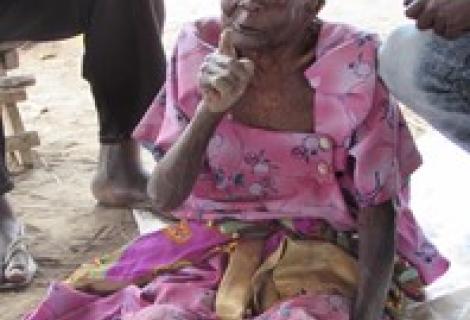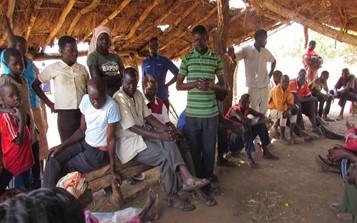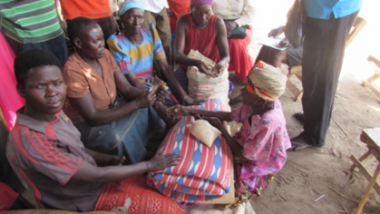Homeless no more

A story of a widow who reclaimed her right to land ownership.
The insurgency related to the Lord's Resistance Army (LRA) rebels in northern Uganda and castle rustling by the neighboring Karamojong tribe had caused a lot of unrest for the people of Katakwi district.
Christine shares her story;
"My name is Adikorit Christine, I’m 100-years-old and a resident of Oburatum village in Katakwi district.
In 1985, my husband and I got married and we lived happily in Oburatum until we were invaded by the Lord's Resistance Army rebels. To keep us safe, we were forced to leave everything behind and move into Internally Displaced (IDP) camps where I unfortunately lost my husband to natural causes.
After the insurgency died down, I returned from the camp to my home and found that our land had been occupied by my in-laws. They denied me access to any of my property saying that I had no right to be there since I did not bare their son any children before he passed on.
My situation only worsened when the village was raided by the Karamojong who aimed to steal cattle. In the raids, I lost the last of my possessions and was forced back into the displacement camps for survival.
Life in the IDP camps was never easy but it got even harder for me because that is where I had lost my husband.
When I returned to Oburatum in 2005. I thought I would pick up my life and settle in matrimonial home but that was not the case as I found a new set of people living there.
On confrontation, these people said they had no idea who I was and that I had no right to live there or own that land. This led me to escalate my issue to the clan leaders who I thought would quickly give me redress but was shocked to hear them say that they did not know me either and that I had no known family members in the village.
I was then reduced to wandering and begging on the streets in Usuk trading center for a period of about sixteen years in order to survive.
My turning point came in January 2021, when a distant relative on her way to the market bumped into me and picked me from Usuk trading center, taking me to her home.
She sympathized with my situation and helped me report the matter to the Action Aid Gender Based Violence shelter in Katakwi. Because the shelter is very far from where I stay, I couldn’t make the visit physically."
I found my Aunty Christine in a very sorry state. Her body was infested with jiggers and bedbugs latched onto her clothing. She was sleeping in a house that had neither a roof nor a door and was the mockery of the trading center. This made me sad so I took her with me to my home. I had heard many women testify that they had been helped by ActionAid to access their property and settle marital disputes."
narrated the care taker.
"My niece then met with the ActionAid staff to narrate my story and they reassured her that I would be helped.
In February 2021, a community land meeting was convened by ActionAid to hear my case. During the mediation that was attended by the Local Council and clan leaders, education on women land rights and productive resources and right to inherit property was given. This prompted my relatives to finally admit to having lied and that I was their great Aunt. They publicly apologized for the way they had treated me and for the pain and humiliation I had been subjected to while living on the streets of Uruk."

"We did not know that women too could inherit land and that they had the rights to own any property. Going forward, we shall convene a clan meeting to handle matters of land administration of the survivor. "
stated the clan leader
.
"I thank ActionAid for reconciling us with our great aunt Christine. On behalf of the clan, we welcome you back home and ask you to forgive us where we have wronged you, we pledge to take good care of you" - her relatives said.

"They even went ahead to give me some money and food items like groundnuts, cassava, eggs and rice. They also committed to taking care of me so I could live comfortably until that time I would leave this earth. I have not felt any love or sense of belonging in such a long time."
Despite the governing laws, women remain marginalized when it comes on land ownership in Uganda because communities are predominantly patriarchal. Negative cultural norms in rural Uganda are therefore used to overpower women and girls, denying them respect and the right to live a life of dignity.
Ignorance of the legal reforms on women and girls by communities and leaders such as the clan leaders, police, Local Councils, and others are big obstacles to women's access to justice especially their rights including right to property, land health, information.
To achieve women access to justice, there is need to scale up sensitization of communities on the rights of women and girls, to educate and strengthen the capacity of religious and cultural institutions to appreciate and manage the injustices that stem from negative social norms.